#i just am fundamentally opposed
Text
The more I think about it the more I really, really hate that ending for Ted. Most of the episode I loved but Jesus. Ted, to our knowledge, has no active support structures in Kansas. In one foul swoop he loses his best friend, his therapist, his emotional support bros, his gossip pals, and the group of men who have helped inspire him to keep going over the past three years. Yes he gets Henry back and that's wonderful but like. He has no one else? And a kid cannot be an emotional outlet for your baggage.
Michelle can't be his support. Even if they develop feelings for each other romantically again, we've seen she's objectively bad at recognizing when Ted needs support. (I personally dont trust her after the Dr. Jacob shit but to each their own). When his panic attacks were revealed she just figured he was laughing it off with no issue based on one text conversation. She didn't even call. I understand that man is no longer your husband but aren't you still friends? Shouldn't you care about WHY he was having panic attacks?
So yes, Ted goes back to support his kid. And I'm sure he'll do all he can for Henry. He's a good dad. However, I genuinely fear for the state of Ted's mental health now that he's back in Kansas. Your kid cannot be your only friend. It just feels like a more bitter than sweet ending. Because while the show may not have been all about Ted, his story MATTERED. His influence was not the sole story. His personal growth, overcoming his panic attacks and recognizing his limitations better, that was the central story of the show. This ending just feels insufficient.
I'd almost say unfinished but the writers won't even confirm if this is the actual show ending or not.
#ted lasso#sorry for the rant#i just am fundamentally opposed#to stories that end with a found family breaking up#except leverage#they did that correctly
13 notes
·
View notes
Text
I've been moving and navigating further departmental nonsense etc (my pseudo-dissertation got approved for defending, though! l o l). But it was interesting to see the Worst P&P Takes poll I reblogged accumulating more results and the general tenor of responses in the notes.
I mean, the results are definitely to be expected if you're familiar with the side of Austen fandom doing a lot of the reblogging etc. But still, interesting!
Many Tumblr polls specify that they're asking about personal preferences that may be irrational—favorite/least favorite, coolest/most annoying, or something like that. This one, though, asked for the worst interpretation of P&P, not the most annoying one—and the current leader is "Darcy is never really proud, he's just shy and probably has anxiety" against some very steep competition on the Bad Takes front.
I was thinking about why that seemed a kind of tediously predictable choice even though I agree that the take is wrong, and realized that while I do disagree with the shy Darcy interpretation and I particularly disagree with the specific formulation where he is never proud at all, it ultimately feels to me like a failure of nuance rather than just completely wrongheaded like some of the others. And this is probably my fundamental difference with a lot of Darcy takes I see!
In my opinion, a character who is introverted and who feels awkward in various social situations and who doesn't like common social activities and who has to work himself up to talking to his crush and who is repeatedly suggested to behave very differently in contexts where he's more comfortable being interpreted as shy and anxious is not that big of a leap.
Yes, it's important that he is actually fundamentally confident and haughty, that he makes his personal feelings of discomfort other people's problem, and that he thinks he's such a unique and special butterfly that he doesn't need to even put in an effort outside his personal social circle. But it's a misreading that is easy to follow (and long predates the 2005 P&P, as I've mentioned before!).
The additional misreading that a shy and anxious Darcy is also never proud at all is a much more drastic leap, and in my experience, condemnations of shy Darcy interpretations rarely differentiate between "Darcy is shy as well as arrogant" and "Darcy is shy rather than arrogant" as interpretations (although their basic arguments are quite different). But even that as the worst possible misreading of P&P when Darcy is not even the main character is ?????????
I mean, for one alternative (not even the one I voted for!), the idea that Elizabeth is an author avatar Mary Sue seems a far worse misreading of P&P than basically anything to do with Darcy at all. The center piece of the entire novel is Elizabeth's epiphany of self-knowledge about her own shortcomings that do not particularly resemble Austen's at all, but were ethically a concern for her, and she's a complex, interesting character in general whom Austen correctly regarded as a major achievement. Inverting that into Elizabeth as an improbably perfect, reality-warping self-insert is deeply wrong and frankly pretty misogynistic as well.
(ngl though, it's a little funny to see such a blatantly terrible reading of Elizabeth rank so far behind the shy Darcy votes. I've gotten "does anyone actually think/say that?" so many times on my posts about Austen fandom's prioritization of Darcy's character development over Elizabeth's and yet...)
And even just going with the Darcy-centric misreadings, the idea of Darcy as a "bad boy" seems easily the most absolutely wrong take on him. His pride is at least complicated and the finer points can be fairly debated and it's a quality that actually changes somewhat throughout the novel, and you can have discussion over what happened when, whose testimonies should be weighted more, etc. But there is no point at which "bad boy" isn't utterly wrong for him. However, there's definitely a tendency in some wings of the fandom to find the idea of Darcy being misread too favorably more objectionable than him being read too unfavorably, regardless of the particulars, so it's not a surprise.
I suppose you could argue about what "worst" means in the context of variously bad interpretations. Like, is an interpretation that is about a fairly trivial aspect of the book but extremely wrong about it "worse" than an interpretation that is pretty bad but at least comprehensibly so about something very important?
#i remember years ago mentioning that i disagree with the darcy 'shy-ites' but am more opposed to the 'anti-shy-ites'#but was not exactly clear on why apart from their tendency to frame the anti-darcy position as more rigorous and less informed by adaptatio#(this was the case even before the 2005 came out but vastly more so afterwards and deeply annoying as a lesbian fan of the book)#(lesbian is pertinent because many dismissive anti-shy-ite takes assume that more positive interpretations of him#are based on attraction to a particular actor playing on him rather than the text. also it's more acceptable when it's colin firth somehow)#in any case for me it's like ... yeah i think the shy!darcy crowd is wrong but only because it's more complicated than that#not because it's completely baseless#and 'shy rather than proud' is truly wrong but there's enough emphasis on him being different than elizabeth thought all along that i get i#elizabeth as a mary sue or bad boy darcy or actually it's about toxic masculinity etc are just fundamentally wrong in a very basic way#that no amount of nuance or discussion of vocabulary can really address#anghraine babbles#austen blogging#austen fanwank#lady anne blogging#long post#poll nonsense#anghraine rants
78 notes
·
View notes
Text
Alright alright alright! Speedrun time so I can finish this run, finish the Act 3 write up, and start posting the Shadowheart origin fic. Did quite a bit all in one day, so let's gooooo.
Went to the sewers and found Nine Fingers Keene, someone on my list of NPC's who absolutely should be kissable but isn't cause Larian is full of cowards!
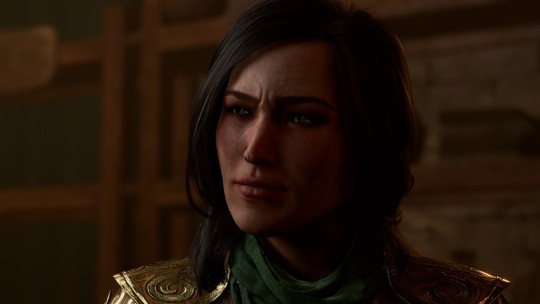
Went to the bank and found this guy.
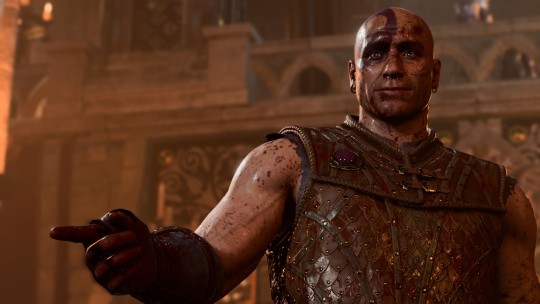
Followed his stench right on back to the sewers. But unfortunately Jaheira got, *cough*, left behind at Moonrise so Minsc also got, uuuhhhhhh, left behind.
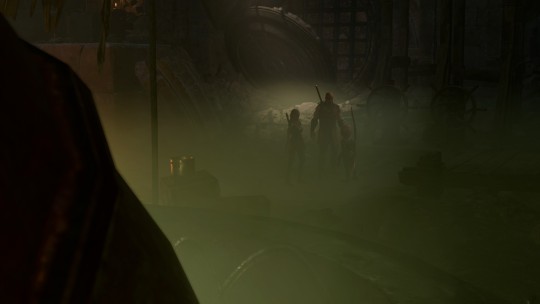
Unfortunately, a civil war broke out between the Guild and the Zhent. Sided with the Guild cause, who wouldn’t. Although, Minthara had some ideas about what to do with the undesirables once we take over the city. Always the little schemer she is.
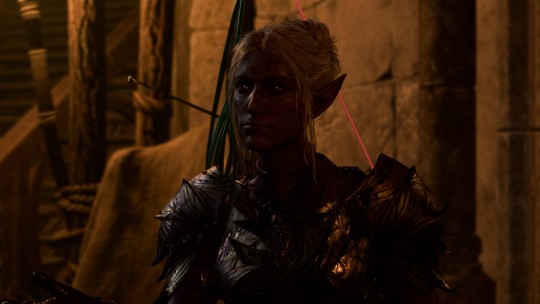
Met some weirdos!
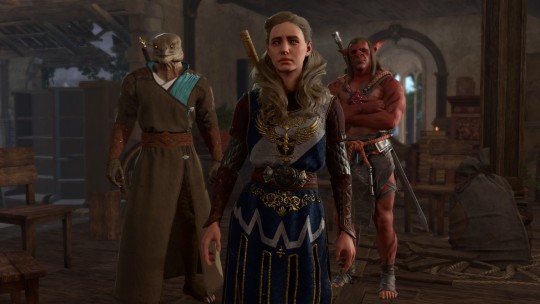
Met a pirate who had quite a thing for Minthara. I mean, "Captain Grizzly" was laying down that rizz HARD. But, can we blame her?
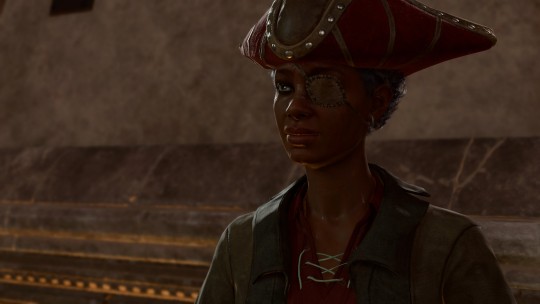
Killed Lora and returned to the Captain. Surprise, it's Ethel! Don't care, gimme my money. Also got an ally with a very useful skill for the most annoying fight later. *Minthara approves*.
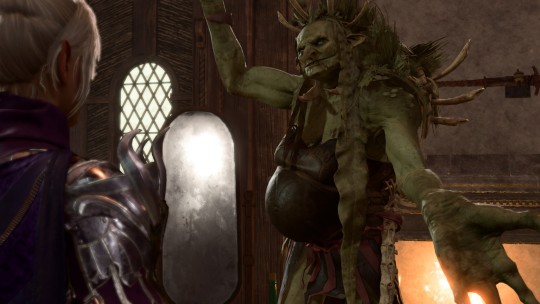
Shadowheart went home and met her mother. Poor girl was boutta cry! Also had some pretty triggering memories while going through the cloister.
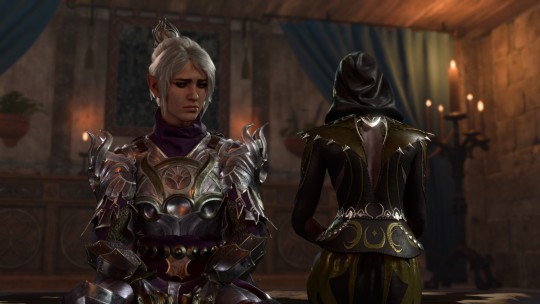
It has been so long since I've made Shadowheart go down the Selunite path that I forgot how much of a pain in the ass the House of Grief fight was. I wanted to rip my skin off the entire time! I spent thirty minutes watching Minthara and Shadowheart get blinded over and over and then have their asses beat. I actually had to go pull out the hirelings. Holy shit, I fucking hate the Sharrans! If you ever need a good reason to have Shadowheart go down the DJ path, this bullshit of a lineup is a good damn reason!

Viconia, on the ground, begging for mercy. Shadowheart did not care what happened and wanted Viconia to embrace loss. Minthara said "fuck your mother and fuck your mercy" and killed Shadowheart's mother. Gah, what a romantic she is!
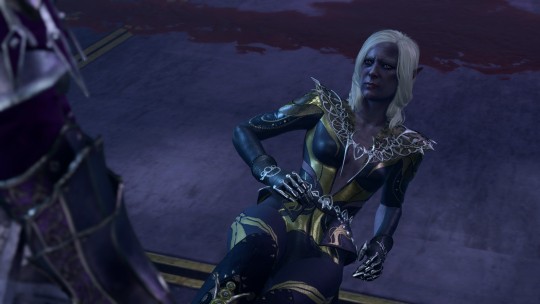
I HATE SHAR! I HATE SHAR SO DAMN MUCH! FORGET THE DEAD THREE, LARIAN, LEMME KILL SHAR! THERE ARE VERY FEW THINGS I CONSIDER TO BE TRULY EVIL AND SHAR IS MOST DEFINITELY ONE OF THEM!
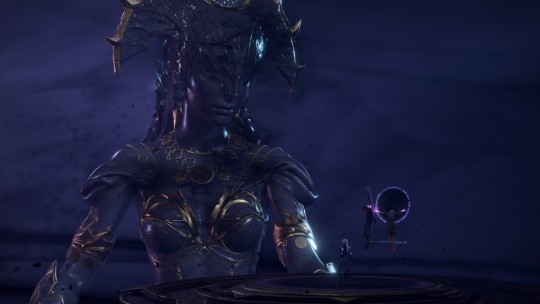
The price of freedom is never free...
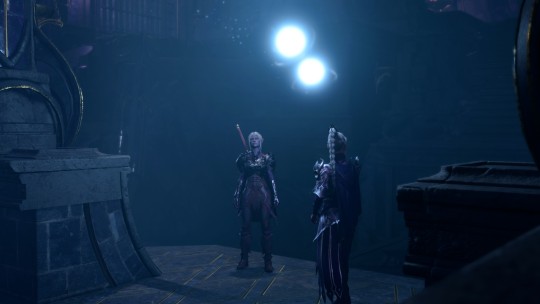
What a whirlwind of a day. Fought in a civil war between thieves, ran into some old enemies, and Shadowheart went through one of the most traumatizing things in her life and killed every parental figure she’s ever had in a span of ten minutes! But, that’s okay. Minthara made her feel all better. After all, killing your parents is a rite of passage.
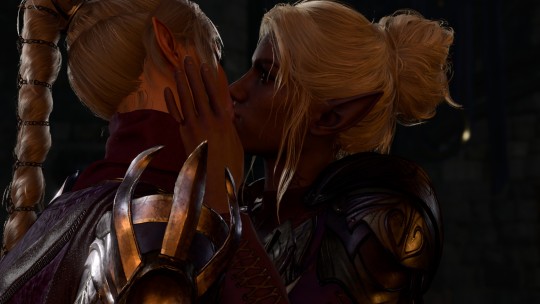
< The Wizard | The Foundry and Gortash >
#bg3#baldur's gate 3#shadowheart#shadowheart origin#minthara#minthara baenre#evil murder kitten#shadowheart x minthara#team mommy issues#semi-evil lesbians#FUCK SHAR#but if i am being honest. shar isn't actually killable no matter how much i want her to be#shar isn't like the dead three or like minor gods like lolth#shar is a primordial god and was one of the first gods to come into creation alongside selune#she is the embodiment of darkness. nothingness. the void. all fundamental laws of reality and she cannot just be destroyed#even if she could die. some other version of her would just be reborn in her place#kinda like 'mystra' who gets resurrected over and over cause a god of magic *has* to exist because magic is a fundamental law of reality#shar and selune have to always exist because the two opposing forces provide the healthy push and pull of good and evil in the world#and everything happening within Act 2 and the shadow curse shows that#ketheric - a selunite turned sharran - is an unfortunate example of what happens when one side of the scale gets too heavy#shadowheart - a sharran turned selunite - who doesn't raid the grove and spares halsin so he can pull thaniel out of the shadowfell#and frees dame aylin to kill ketheric and break the shadowcurse is the scale tipping back into equilibrium
17 notes
·
View notes
Text
buying a shirt that says future milf and accidentally giving my mom hope that I'll have kids one day
#i have to be soooo careful cause everytime shes like “so no kids 😔” i get the urge to go out n get pregnant just to make her happy#but i am so fundamentally opposed to the idea of having kids that i couldnt even force myself like. i was NOT meant to be someones mom lol
2 notes
·
View notes
Text
sorry y’all if there’s one thing i’m gonna do it’s hate on the x files s05e08 “kitsunegari”
#a one person vendetta lmao#it’s not a BAD episode per say but it does too too much tell not show and i am just fundamentally opposed to its conception lol#txf#txf rewatch
6 notes
·
View notes
Text
You're a reasonably informed person on the internet. You've experienced things like no longer being able to get files off an old storage device, media you've downloaded suddenly going poof, sites and forums with troves full of people's thoughts and ideas vanishing forever. You've heard of cybercrime. You've read articles about lost media. You have at least a basic understanding that digital data is vulnerable, is what I'm saying.
I'm guessing that you're also aware that history is, you know... important? And that it's an ongoing study, requiring ... data about how people live? And that it's not just about stanning celebrities that happen to be dead?
Congratulations, you are significantly better-informed than the British government!
So they're currently like "Oh hai can we destroy all these historical documents pls? To save money? Because we'll digitise them first so it's fine! That'll be easy, cheap and reliable -- right? These wills from the 1850s will totally be fine for another 170 years as a PNG or whatever, yeah? We didn't need to do an impact assesment about this because it's clearly win-win! We'd keep the physical wills of Famous People™ though because Famous People™ actually matter, unlike you plebs. We don't think there are any equalities implications about this, either! Also the only examples of Famous People™ we can think of are all white and rich, only one is a woman and she got famous because of the guy she married. Kisses!"
Yes, this is the same Government that's like "Oh no removing a statue of slave trader is erasing history :("
You have, however, until 23 February 2024 to politely inquire of them what the fuck they are smoking. And they will have to publish a summary of the responses they receive. And it will look kind of bad if the feedback is well-argued, informative and overwhelmingly negative and they go ahead and do it anyway. I currently edit documents including responses to consultations like (but significantly less insane) than this one. Responses do actually matter.
I would particularly encourage British people/people based in the UK to do this, but as far as I can see it doesn't say you have to be either. If you are, say, a historian or an archivist, or someone who specialises in digital data do say so and draw on your expertise in your answers.
This isn't a question of filling out a form. You have to manually compose an email answering the 12 questions in the consultation paper at the link above. I'll put my own answers under the fold.
Note -- I never know if I'm being too rude in these sorts of things. You probably shouldn't be ruder than I have been.
Please do not copy and paste any of this: that would defeat the purpose. This isn't a petition, they need to see a range of individual responses. But it may give you a jumping-off point.
Question 1: Should the current law providing for the inspection of wills be preserved?
Yes. Our ability to understand our shared past is a fundamental aspect of our heritage. It is not possible for any authority to know in advance what future insights they are supporting or impeding by their treatment of material evidence. Safeguarding the historical record for future generations should be considered an extremely important duty.
Question 2: Are there any reforms you would suggest to the current law enabling wills to be inspected?
No.
Question 3: Are there any reasons why the High Court should store original paper will documents on a permanent basis, as opposed to just retaining a digitised copy of that material?
Yes. I am amazed that the recent cyber attack on the British Library, which has effectively paralysed it completely, not been sufficient to answer this question for you. I also refer you to the fate of the Domesday Project. Digital storage is useful and can help more people access information; however, it is also inherently fragile. Malice, accident, or eventual inevitable obsolescence not merely might occur, but absolutely should be expected. It is ludicrously naive and reflects a truly unpardonable ignorance to assume that information preserved only in digital form is somehow inviolable and safe, or that a physical document once digitised, never need be digitised again..At absolute minimum, it should be understood as certain that at least some of any digital-only archive will eventually be permanently lost. It is not remotely implausible that all of it would be. Preserving the physical documents provides a crucial failsafe. It also allows any errors in reproduction -- also inevitable-- to be, eventually, seen and corrected. Note that maintaining, upgrading and replacing digital infrastructure is not free, easy or reliable. Over the long term, risks to the data concerned can only accumulate.
"Unlike the methods for preserving analog documents that have been honed over millennia, there is no deep precedence to look to regarding the management of digital records. As such, the processing, long-term storage, and distribution potential of archival digital data are highly unresolved issues. [..] the more digital data is migrated, translated, and re-compressed into new formats, the more room there is for information to be lost, be it at the microbit-level of preservation. Any failure to contend with the instability of digital storage mediums, hardware obsolescence, and software obsolescence thus meets a terminal end—the definitive loss of information. The common belief that digital data is safe so long as it is backed up according to the 3-2-1 rule (3 copies on 2 different formats with 1 copy saved off site) belies the fact that it is fundamentally unclear how long digital information can or will remain intact. What is certain is that its unique vulnerabilities do become more pertinent with age." -- James Boyda, On Loss in the 21st Century: Digital Decay and the Archive, Introduction.
Question 4: Do you agree that after a certain time original paper documents (from 1858 onwards) may be destroyed (other than for famous individuals)? Are there any alternatives, involving the public or private sector, you can suggest to their being destroyed?
Absolutely not. And I would have hoped we were past the "great man" theory of history. Firstly, you do not know which figures will still be considered "famous" in the future and which currently obscure individuals may deserve and eventually receive greater attention. I note that of the three figures you mention here as notable enough to have their wills preserved, all are white, the majority are male (the one woman having achieved fame through marriage) and all were wealthy at the time of their death. Any such approach will certainly cull evidence of the lives of women, people of colour and the poor from the historical record, and send a clear message about whose lives you consider worth remembering.
Secondly, the famous and successsful are only a small part of our history. Understanding the realities that shaped our past and continue to mould our present requires evidence of the lives of so-called "ordinary people"!
Did you even speak to any historians before coming up with this idea?
Entrusting the documents to the private sector would be similarly disastrous. What happens when a private company goes bust or decides that preserving this material is no longer profitable? What reasonable person, confronted with our crumbling privatised water infrastructure, would willingly consign any part of our heritage to a similar fate?
Question 5: Do you agree that there is equivalence between paper and digital copies of wills so that the ECA 2000 can be used?
No. And it raises serious questions about the skill and knowledge base within HMCTS and the government that the very basic concepts of data loss and the digital dark age appear to be unknown to you. I also refer you to the Domesday Project.
Question 6: Are there any other matters directly related to the retention of digital or paper wills that are not covered by the proposed exercise of the powers in the ECA 2000 that you consider are necessary?
Destroying the physical documents will always be an unforgivable dereliction of legal and moral duty.
Question 7: If the Government pursues preserving permanently only a digital copy of a will document, should it seek to reform the primary legislation by introducing a Bill or do so under the ECA 2000?
Destroying the physical documents will always be an unforgivable dereliction of legal and moral duty.
Question 8: If the Government moves to digital only copies of original will documents, what do you think the retention period for the original paper wills should be? Please give reasons and state what you believe the minimum retention period should be and whether you consider the Government’s suggestion of 25 years to be reasonable.
There is no good version of this plan. The physical documents should be preserved.
Question 9: Do you agree with the principle that wills of famous people should be preserved in the original paper form for historic interest?
This question betrays deep ignorance of what "historic interest" actually is. The study of history is not simply glorified celebrity gossip. If anything, the physical wills of currently famous people could be considered more expendable as it is likely that their contents are so widely diffused as to be relatively "safe", whereas the wills of so-called "ordinary people" will, especially in aggregate, provide insights that have not yet been explored.
Question 10: Do you have any initial suggestions on the criteria which should be adopted for identifying famous/historic figures whose original paper will document should be preserved permanently?
Abandon this entire lamentable plan. As previously discussed, you do not and cannot know who will be considered "famous" in the future, and fame is a profoundly flawed criterion of historical significance.
Question 11: Do you agree that the Probate Registries should only permanently retain wills and codicils from the documents submitted in support of a probate application? Please explain, if setting out the case for retention of any other documents.
No, all the documents should be preserved indefinitely.
Question 12: Do you agree that we have correctly identified the range and extent of the equalities impacts under each of these proposals set out in this consultation? Please give reasons and supply evidence of further equalities impacts as appropriate.
No. You appear to have neglected equalities impacts entirely. As discussed, in your drive to prioritise "famous people", your plan will certainly prioritise the white, wealthy and mostly the male, as your "Charles Dickens, Charles Darwin and Princess Diana" examples amply indicate. This plan will create a two-tier system where evidence of the lives of the privileged is carefully preserved while information regarding people of colour, women, the working class and other disadvantaged groups is disproportionately abandoned to digital decay and eventual loss. Current and future historians from, or specialising in the history of minority groups will be especially impoverished by this.
16K notes
·
View notes
Text
It is possible to interact with people whom share opposing views and no this is not about pineapple on pizza. In fact, it is imperative that you learn how to be civil with some people who you may find difficult to agree with.
At work, Youngin would often tell me that the guy that trained him (Ginger) was a misogynist. I had never met Ginger, and I had very little to say on this matter. But I would ask Youngin some questions about him because I like to know the other seasonal workers a little. I ask about Ginger- first words from Youngin's mouth 'he's a misogynist.'
I asked him why he thought that. (There are many misogynists at this location, as someone that is woman-shaped I see it often, I am comparing notes.)
"We were on our way to a location and a driver was going really slowly. When he got around her he said 'fucking women drivers.' Like he was going out of his way to prove that the driver was a woman."
The last month or so, Youngin worked exclusively with me because I knew that it was a matter of time before he said something that pissed off one of the guys. He was not going to get along with people here, it just wasn't happening.
When he left, everyone wanted to know what he was like to work with. And I finally got to have a conversation with Ginger.
"I'd like to ask you something a little strange- he said that on his first day there was an issue with a driver going slowly. Can you tell me about that?"
"Oh yeah! She was going super slow and when I got around her I said 'yup- little old lady driving.' And he was like 'what's that supposed to mean?' And I just kind of dropped it, but I hear he was saying I was a misogynist over it?"
So I give Youngin some grace because he's young, he's got a social bubble that's very liberal, he has not met very many people that weren't part of that kind of scene. But he often talked about how every person here has said something that pissed him off and he seemed really surprised that I (woman-shaped queer liberal) would be okay working with all these sexist homophobes.
And I give grace to Ginger because he had no reason to think that his words would be interpreted like that. What he was saying was normal to him. This is... somewhat the culture of landscaping jobs. And its not even close to the worst thing I've heard out of these dudes mouths. (Literally had one of the dudes comment that he would like to 'motorboat' one of the pedestrians.)
It was weird for Youngin to carry that with him for the whole two months that he worked here, over a very... small comment.
Every single person I've worked with here has said something that has given me pause and I tuck it away to rant about later and then I let it go. If it gets out of hand, I talk to one of the bosses about it. I know how to contact HR. I came into this place knowing that I was going to disagree politically with most of the people that I work with because I'm coming in to a culture that is fundamentally different from my own.
If I am being frank, I find the overt bigotry somewhat better than the corporate bullshit of 'we value your contributions, but won't be granting your accommodations request out of fairness to other workers' or the glass cliff or literally being fired for my sexual orientation but phrased with 'oh you just weren't a good fit for the culture here.' I at least know what I'm getting into when I come to work. I know what not to talk about. Last time I thought I was safe to talk about something queer with my boss she blindsided me with some transphobic garbage.
Its admirable to stick up for the marginalized people in your life, but part of changing minds is knowing the time and the place to comment. I think I've changed more minds at this warehouse by being a visibly out lesbian at work than I have by making carefully crafted speeches.
That is fine. It is fine to disagree. Sometimes you have to work with racists, homophobes, and assholes. That is part of being an adult. You talk about things like... sports or TV or weather or some cool bug you saw. Finding common ground with people who are different from you in many ways is an important part of socialization and it sucks to think you have anything in common with a jackass but look- you're spending 7-ish hours with these people and at some point some of them are going to say stupid shit. You are going to say stupid shit also. I have said my fair share of stupid shit. Deal with the fact that you're all stupid shits.
And for fuck's sake, wear your hardhat.
5K notes
·
View notes
Text
i have very complicated feelings about how much opposition to KOSA is centered around it being a danger to LGBT kids because - that’s the point of the bill. the republican co-sponsor of the bill marsha blackburn has literally openly said she wants the bill to protect kids from “the transgender.” So when you go around saying the bill is dangerous because it could censor LGBT content and put young LGBT kids in danger - they know that already and it’s why they want to pass the bill. And for people who haven’t thought about it that way, wel now a lot of them have found a new thing to like about the bill. You’re more likely to make a point with that argument if you’re talking to a democrat, but just because this is a right wing culture war it’s not like there aren’t transphobic democrats. Ultimately I feel like the only way to fight KOSA in a productive way is to focus on it primarily as a free speech and privacy issue - which it absolutely is, for everyone - because the more it is treated solely as an LGBT issue the harder republicans are going to go in favor of it which just puts everybody in more danger.
#it’s super dangerous for lgbt people but also literally anyone who wants privacy on the internet!!!!!!#r.txt#i don’t see how any of it productively protects kids either like#social media is bad for kids bc of like. cyberbullying.#censoring content isn’t going to stop other children from bullying them#not that that’s the ONLY problem but like#my understanding of this bill is like even with all the dangers aside it fundamentally misunderstands how kids need to be protected#and i don’t think that is the real motivation behind the bill it’s just a way to get it through but#how could anyone oppose protecting the children!!#anyway i am not a law expert this is just how i feel about it
0 notes
Text

So, I thought it would be funny to see how long I could log into optc before I forgot. I realized today that that was 7 years ago…
#to be clear: I am fundamentally opposed to spending money on gacha games#I don’t even spend much time actually playing#I just log in every morning as like… a joke. that turned into a habit. I guess.#I suppose 7 years is approximate really because I didn’t account for leap years but 2555/365=7#I’m not exactly calculating something critical here
0 notes
Text
i don't fundamentally disagree with the notion of, like, not praising people for doing the absolute bare minimum. however, i am very much opposed to its common usage as an excuse to treat people poorly under the presumption that they probably deserve it, then deflect any criticism for doing so. ie. making a rude comment about a cishet person under the assumption that they're bigoted, being informed that said cishet person is actually an ally, and then angrily responding "so, what, am i supposed to reward them for the bare minimum???" no, buddy, you're supposed to not be mean to people just because you incorrectly assume that they would be mean to you if given the chance. showing ppl basic human decency is not a "reward", it's like. more of a basic right.
784 notes
·
View notes
Note
I don't understand the chevron law thing, could you explain it like I'm five? Should we be working towards fixing whatever the courts just fucked up?
So, okay, I am condensing like a semester of a class I took in 2017 into a very short explanation, but:
It would be really annoying for Congress to individually pass laws approving every new medicine or listing out every single poison you can't have in tap water, so instead there are agencies created by Congress, via a law, to handle a specific thing. The agencies are created by Congress but overseen by the executive branch (so, the president), which is why we say things like "Reagan's EPA" or "Biden's DOJ" - even though Congress creates them, the president determines how they do the thing Congress wants them to do, by passing regulations like "you can't dump cyanide in the local swimming pool" and "no, you can't dump strychnine, either."
However, sometimes people will oppose these regulations by saying that the agency is going beyond the task they were given by Congress. "The Clean Air Act only bans 'pollutants,' and nowhere in the law does it say that 'pollutants' includes arsenic! You're going beyond your mandate!" To which the experts at the EPA would be like, "We, the experts at the EPA, have decided arsenic is a pollutant." On the flip side, the EPA could be like, "We, the experts at the EPA, have decided that arsenic isn't a pollutant," and people would oppose that regulation by being like, "But the Clean Air Act bans 'pollutants,' and it's insane to say that arsenic isn't a pollutant!" So whose interpretation is correct, the government's or the challengers'?
Chevron deference basically put heavy weight onto how the agency (i.e. the government) interpreted the law, with the assumption that the agency was in the right and needing pretty strong evidence that they were interpreting it wrong (like, blatantly doing the opposite of a clear part of the law or something). If there was any ambiguity in how the law was written, you'd defer to the agency's interpretation, even if that interpretation was different depending on who was president at the time.
(Note: there are other ways of challenging regulations other than this one, like saying that they were promulgated in a way that is "arbitrary and capricious" – basically, not backed by any evidence/reasoning other than "we want it." Lots of Trump-era regulations got smacked with this one, though I think they'd be better at it if Trump gets a second term, since they've now had practice.)
Chevron deference wasn't all good – remember that the sword cuts both ways, including when dickholes are in power – but it was a very standard part of the law. Like, any opposition to a regulation would have some citation to be like "Chevron doesn't apply here" and every defense would be like "Chevron absolutely applies here" and most of the time, the agency would win. Like, it was a fundamental aspect of law since the 80s.
The Supreme Court decision basically tosses that out, and says, "In a situation where the law is ambiguous, the court decides what it means." That's not completely insane – interpreting law is a thing judges normally do – but in a situation where the interpretation may hinge on something very complicated outside of the judge's wheelhouse, you now cannot be like, "Your Honor, I promise you that the experts at NOAA know a lot about the weather and made this decision for a good reason."
The main reason it's a problem is that it allows judges to override agencies' judgements about what you should do about a thing and what things you should be working on in the first place. However, I don't think there's really a way of enshrining that into law, outside of maybe adding something to the Administrative Procedure Act, and that would require a Congress that isn't majority Republican.
I will say that kind of I expected this to happen, just because IIRC Gorsuch in particular hates Chevron deference. IMO it's a classic case of "rules for me but not for thee" – Scalia and other conservatives used to rely on Chevron because they wanted their presidents to hold a ton of unchecked power (except for the EPA), but now that we've had Obama and Biden, now conservatives don't like Chevron because it gives the presidents they don't like unchecked power.
#askbox#personal#Anonymous#bb is a lawyer#bb had a whole flow chart for admin law finals that is now moot#chevron deference
699 notes
·
View notes
Text
I did a poll the other day about this from the [Jewish] Zionist perspective; I'm now curious about the Jewish anti-Zionist perspective.
To answer this poll, you MUST identify as BOTH Jewish and anti-Zionist. Jewish non-Zionists, post-Zionists, refusetoidentifyniks, other assorted folks, and goyim of any political persuasion, please just choose the see results button. Thanks!!
Also: This poll is meant for genuine listening, learning, and seeing the true thoughts of other Jews. I stg if I see anyone attacking any people nice enough to respond to this poll and give serious explanations for their answers, like folks did on the original poll?
I will find you.
If you don't like it, keep scrolling. Thank you!!
Edit: Please do reblog for reach regardless of your background or views; I'd appreciate it!
#jumblr#i/p#palestine#free palestine#jewish antizionism#jews for palestine#to be clear#the warnings are preemptive#however I want it clear that this is a poll post meant for positive exchange of ideas not discourse
527 notes
·
View notes
Note
you said that religion is actions and relations, not beliefs- would you be willing to elaborate and/or point to some reading? or like at least defining what "beliefs" means here?
sure. now i'm sure there's some much more recent scholarship on this but everything i think of this is fundamentally drawing on/extrapolating on the german ideology and gramsci's work--but the gist of it is that there is no (let us take an example) 'islam' that exists independent of its practicioners. this is a materialist (as opposed to idealist) stance on religion (& ideology more generally).
so what this means is that--sure, everything that comes under the umbrella of 'islam' does in fact share a few core concepts (the quran, the indivisbility of god, mohammad as a prophet)--but that attempts to make any sweeping generalized statement about the ideological content of islam are bound to fail because ultimately the islam of the iranian state apparatus & the islam of the taliban & the islam of muslim feminists in indonesia & the islam of the PLO & the islam of liberal arab-americans are all fundamentally different ideologically because they are shaped not by some eternal essence of islam but by the social circumstances and communities within which each of these groups is practing.
(want to be super clear that i am just using islam as an example here, the same can be applied to any religion in any place--christianity, for example, is not uniquely genocidal & colonial due to some inherent ideological content, which is why going through the bible to point out violence & slavery and being like 'see, this is what's wrong with christianity' is a futile exercise--christianity has been the religion of a genocidal & colonial ruling class across much of the globe, and so that practice of it of course takes on that character)
hence, for example, there's absolutely no contradiction between, say, the judaism of diaspora reform jews & that of the israeli state--the stark difference makes sense when you realize that they are not both informed ideologically by some inherent essence of judaism but by the historical context of centuries of persecution vs. decades of genocidal state building. no religion has an innate inextricable character--all character that a religion has is given to it when it becomes a social fact, and comes from the people who practice it and their material and power relations.
3K notes
·
View notes
Text
by POTKIN AZARMEHR
‘Pro-Palestine’ protests have become a near-weekly occurrence across Britain. Since Hamas’s 7 October massacre, regular marches have been drawing in a growing number of young people, marked by passionate advocacy and fervent slogans. Yet despite their zeal, many of these protesters lack a fundamental understanding of the conflict they are so vociferously decrying.
In the past six months, I have attended many of these marches. Having engaged with numerous protesters, I have noticed a startling disconnect between their strong opinions on the Gaza conflict and their shaky grasp of basic facts about it. Among the most perplexing are the LGBT and feminist groups (the ‘Queers for Palestine’ types) who flirt with justifying Hamas’s atrocities. This is a bewildering alliance, given that Hamas’s Islamist ideology is clearly antithetical to the rights and values these groups claim to champion. Its reactionary agenda is profoundly hostile to women’s rights and LGBT individuals.
Protesters seem eager to make excuses for Hamas, but are conspicuously uninformed about exactly what or who this terrorist group represents. On 18 May, during a protest at Piccadilly Circus in London, I spoke to demonstrators who firmly believed that Hamas represents all Palestinians. When I questioned a well-educated participant about the last Palestinian election, she was unaware that none had occurred since 2006, when Hamas gained power in Gaza.
It wasn’t just young people who were uninformed. An older woman with an American accent, seemingly a veteran protester, admitted she knew that Hamas was linked to the Muslim Brotherhood, but had no deeper knowledge of its ideology or history. Others, such as members of revolutionary socialist groups, displayed similar gaps in understanding, unaware of critical events like the 1979 Iranian Revolution.
That revolution gave birth to the Islamic Republic of Iran, a theocratic regime that brutally oppresses its own citizens. It also sponsors Islamist groups like Hamas. I left Iran for the UK not long after that regime began and have spent years resisting its religious extremism and ruthless political intolerance. Protesters were not only unaware of these facts about the Iranian regime, but also ill-informed about the struggle against it, such as the ‘Woman, Life, Freedom’ protests against the government that began in 2022.
One particularly telling conversation involved a man advocating for a ‘Global Intifada’ to replace capitalism with socialism. When asked about successful socialist models, he was unfamiliar with the Israeli kibbutzim, one of history’s few successful egalitarian experiments. His ignorance of these communal settlements in Israel, built by socialist Jewish immigrants, was all too typical.
Perhaps the most telling moment was captured by commentator Konstantin Kisin earlier this year, when he encountered a young man holding a ‘Socialist Intifada’ placard. The protester admitted he had no idea what this meant and that he had taken the sign simply because it was handed to him.
Reflecting on past movements, such as the American anti-Vietnam War protests of the 1960s and the British Anti-Apartheid Movement of the 1980s, one can’t help but note a stark contrast. Protesters then were generally well-informed about their causes. Today’s pro-Palestine protests, however, seem to be driven more by unthinking fervour than by an understanding of the issues at hand.
Throughout all these protests, I am yet to encounter a single participant who condemns Hamas or carries a placard denouncing its terrorism. This not only undermines the protesters’ cause, but also risks aligning them with groups whose values fundamentally oppose the very rights and freedoms they claim to support. It appears that today’s young protesters are high on ideology, but woefully thin on facts.
Potkin Azarmehr is an Iranian activist and journalist who left Iran for the UK after the revolution of 1979.
285 notes
·
View notes
Text
I don't get why there are no resources for healthy expressions of anger. Are we as a society fundamentally opposed to people feeling anger? Are we afraid that if people get angry they're going to cause destruction so as an alternative we want anger to just not exist? Anger will go somewhere regardless of whether we want it to exist or not, and if a person who has good reasons to be angry, is not allowed to feel angry, they'll get eaten by self hatred and depression because that's what internalizing anger does.
It's also interesting that when abusers and people in power are angry, they can pretty much do whatever they like. Say no to them, they're having crazy revenges, they're tearing apart your stuff, they're starting wars, they're telling you how they're going to kill you in detail, no self restraint, no consequences, nothing. Anger is theirs to do as they please with and in response the society is just, too scared to do anything, so they assume that this specific anger is 'justified' and 'cannot be helped'. However when victims of something are angry, then they're labelled as 'unreasonable' and 'dangerous' and 'unable to move on from things'. Their anger is a problem that needs to be squashed, erased, there's apparently no justifications for these people to be angry, nothing that is reasonable or okay for them to do about it, they just get demonized and shamed for having a completely rational response to injustice.
Is that it then? Those who are able to act out on their anger, get justifications and obedience, but those who are helpless but angry for very good reasons, are just to be suffocated? Anger is allowed only for some parts of human society and it's the most violent, destructive and dangerous part of it too? Where is this getting us? Is the amount of injustice ever going to decrease if we defend injustice, and fight for it to keep going on?
If I look up ways to express anger, I get stuff like 'anger management steps', and 'letting go and moving on from anger', like excuse me. I didn't even get to express 1% of my anger and I need anger management? I have never had problems with controlling my anger, the struggle is to get it out at all! To integrate it into my personality, to hold people accountable without having to think about it, to show resistance when I'm being stepped on! What anger management? Why am I pushed to move away from anger, I haven't even arrived to anger!
Why is it assumed that every person who struggles with expressing anger is a maniac breaking things, enacting revenges, trying to injure or murder people, lashing out and doing harm to everyone around themselves. I can guess why. Because all of the resources are created for people who are letting their anger run wild without a cap and who use anger to get their way. The world is adjusted for people who are allowed to be angry, who were never pushed to the point where getting angry meant loss of survival, where expressions of anger would lead to torture. I am apparently not even considered to exist. I'm either a maniac or not a target audience for anger resources.
If someone's been traumatized out of being able to feel angry, people don't think it's worth having this person angry. It's very obvious this person has giant reasons for anger, so if we let them feel it, they could become 'dangerous', or 'just like their abuser'. You know, being angry at the abuser does not make anyone like the abuser, it makes them Normal. Rational. Having Self Worth. Human. Logical. Reasonable. Engaging in everyone's best fucking interest because you know that abuser is going wreck havoc forever and if nobody is even angry at them, it's giving them an even easier time. Anger is scary when it's in hands of abusers, in the hands of victims it is liberating, just, it puts things into perspective and back where they belong.
Now give me the fucking resources to get angry. I'm sick and tired of hating myself.
#anger#rage#surviving abuse#healing from abuse#abuse recovery#expressing anger#healthy expressions of anger#i got stuck in inability to express anger#and now i am developing self hatred again#i hate it here#get me out
388 notes
·
View notes
Note
i have never thought of the bg3 paths as railroaded before but oh my god... i see your vision. i think that, for all that can be picked apart in the writing of dragon age, the worldbuilding in that series is so so interested in complicating all factions that you can envision a character who /makes sense/ while bouncing through various ideologies. and the sort of fantasy writing in (most of) the forgotten realms doesn't really allow for that.
dao is particularly the light of my life because the origins mechanic is specifically intended to let you create a character who has a distinctive perspective on the world that’s grounded in the worldbuilding. one of my favourite aspects of this is several origins having completely different codex entries on their own culture as opposed to those an outsider would get. it’s really good! it’s also a reasonably grounded world (while obviously silly) because, like, the basic fundamental premise of thedas, from which they ikea flatpack built almost every feature, is “how would people react to magical and fantastical diversity? the same way they react to human diversity.” you’re meant to feel like, aside from i guess the darkspawn, people are normal and have real motivations. sure it has to fulfil certain roles in a story, and dragon age was manufactured too quickly and purposefully for everything to land feeling authentic, but evil in dragon age should feel recognisable. and in most of the origins they give you a chance to do something that is bad, but also totally makes sense, because of the context of your character belonging to this world where these things happen
in dnd/the forgotten realms it’s a bit different because capital e Evil exists, so there are people and deities and devils (and, to open another can of worms, races) whose entire goal is to Do Evil. it’s also harder to produce grounded evil because in a world where i’m being given basically no context and just told to make whatever i want, i don’t have an inch of the kind of social information i get from for example a dao origin: what my character has been taught to believe they should do to survive, who they are willing to sacrifice, whatever. bg3 also happens to have a main plot goal that is, at least for the first part of the game, broadly selfish (“i am sick, and i need a cure”) which works really well for getting a bunch of people with vastly differing moral standards to band together for the same goal, and not so good for any kind of “greater good” type blurred morality, so that’s out too
however much the worldbuilding factors into this, bg3 specifically went for quite a clear distinction between the good path and the capital e Evil Path, and i find it pretty hard to vary up the good path. when i say railroaded i mean you either do the specific thing that gets you a quest down the line or not. i was really disappointed actually in my playthrough where i totally fucked up in the druids’ grove and caused a fight to break out, because it immediately instakilled tons of characters i knew i would need down the line. the few it spared needed some of the dead ones to stay alive in later quests, so it’s like... oh. that’s just... over. for both factions. bg3 arguably lets you do basically anything you want but they are able to do that because if you fuck around it just breaks the entire quest line from coming up again, which means playing a character who fucks up is not even really going to get me consequences it’s just going to cut content from the game. does that make sense? and then the Evil Path is just straight up evil, like... there’s no way for me to complicate and empathise, here, especially playing a blank canvas character whose motivations i would have to make up from nothing, and who faces basically no consequences for not doing this. the only neutral/cowardly/self-interested option in act 1 is to do neither path, which gets me the least content because i literally don’t get to play the fucking game
i don’t know, i’m not saying it’s necessarily bad just that it’s hard for me, personally, and how i like to create characters. especially when you have my constant restart disease and you have to do this all over again a dozen times just for a handful of different dialogue. does any of that make sense
187 notes
·
View notes